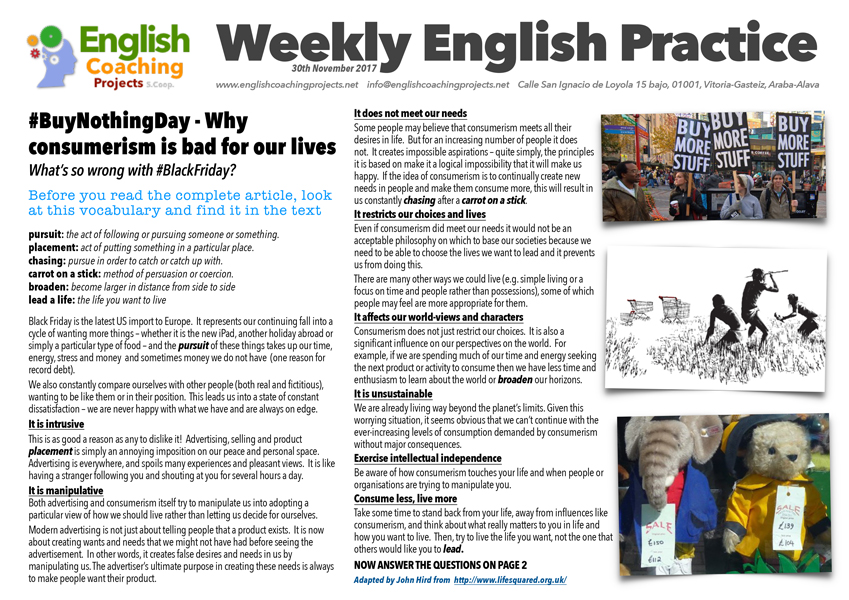Click on the image to download the pdf
Before you read the complete article, look at this vocabulary and find it in the text
pursuit: the act of following or pursuing someone or something.
placement: act of putting something in a particular place.
chasing: pursue in order to catch or catch up with.
carrot on a stick: method of persuasion or coercion.
broaden: become larger in distance from side to side
lead a life: the life you want to live
What’s so wrong with Black Friday?
Black Friday is the latest US import to Europe. It represents our continuing fall into a cycle of wanting more things – whether it is the new iPad, another holiday abroad or simply a particular type of food – and the pursuit of these things takes up our time, energy, stress and money and sometimes money we do not have (one reason for record debt).
We also constantly compare ourselves with other people (both real and fictitious), wanting to be like them or in their position. This leads us into a state of constant dissatisfaction – we are never happy with what we have and are always on edge.
It is intrusive
This is as good a reason as any to dislike it! Advertising, selling and product placement is simply an annoying imposition on our peace and personal space. Advertising is everywhere, and spoils many experiences and pleasant views. It is like having a stranger following you and shouting at you for several hours a day.
It is manipulative
Both advertising and consumerism itself try to manipulate us into adopting a particular view of how we should live rather than letting us decide for ourselves.
Modern advertising is not just about telling people that a product exists. It is now about creating wants and needs that we might not have had before seeing the advertisement. In other words, it creates false desires and needs in us by manipulating us. The advertiser’s ultimate purpose in creating these needs is always to make people want their product.
It does not meet our needs
Some people may believe that consumerism meets all their desires in life. But for an increasing number of people it does not. It creates impossible aspirations – quite simply, the principles it is based on make it a logical impossibility that it will make us happy. If the idea of consumerism is to continually create new needs in people and make them consume more, this will result in us constantly chasing after a carrot on a stick.
It restricts our choices and lives
Even if consumerism did meet our needs it would not be an acceptable philosophy on which to base our societies because we need to be able to choose the lives we want to lead and it prevents us from doing this.
There are many other ways we could live (e.g. simple living or a focus on time and people rather than possessions), some of which people may feel are more appropriate for them.
It affects our world-views and characters
Consumerism does not just restrict our choices. It is also a significant influence on our perspectives on the world. For example, if we are spending much of our time and energy seeking the next product or activity to consume then we have less time and enthusiasm to learn about the world or broaden our horizons.
It is unsustainable
We are already living way beyond the planet’s limits. Given this worrying situation, it seems obvious that we can’t continue with the ever-increasing levels of consumption demanded by consumerism without major consequences.
Exercise intellectual independence
Be aware of how consumerism touches your life and when people or organisations are trying to manipulate you.
Consume less, live more
Take some time to stand back from your life, away from influences like consumerism, and think about what really matters to you in life and how you want to live. Then, try to live the life you want, not the one that others would like you to lead.
“Let’s chat about that!”
Write your answers and send them by email to your ECP coach. Give reasons for your answers.
Why not record your voice too? Listen to yourself speak and identify what you have to improve on 🙂
- Did you buy stuff on Black Friday? Why? Why not?
- Are there any benefits in consumerism?
- What is the role of product labels (like food or clothing brands) in consumerism?
- Do you believe special occasions like Christmas or Easter have become too consumeristic?
- Is there a way to escape the culture of consumerism?
- Do you think there are more consumerist women than men? Why?
- Does mass media and society affect teenage consumerism?
- Our world economy is based on consumerism. Will consumerism always be predominant?
- How does consumerism affect the environment and nature?
- Do you believe that changing your spending habits can make a big difference in your life?
Adapted by John Hird from http://www.lifesquared.org.uk/

